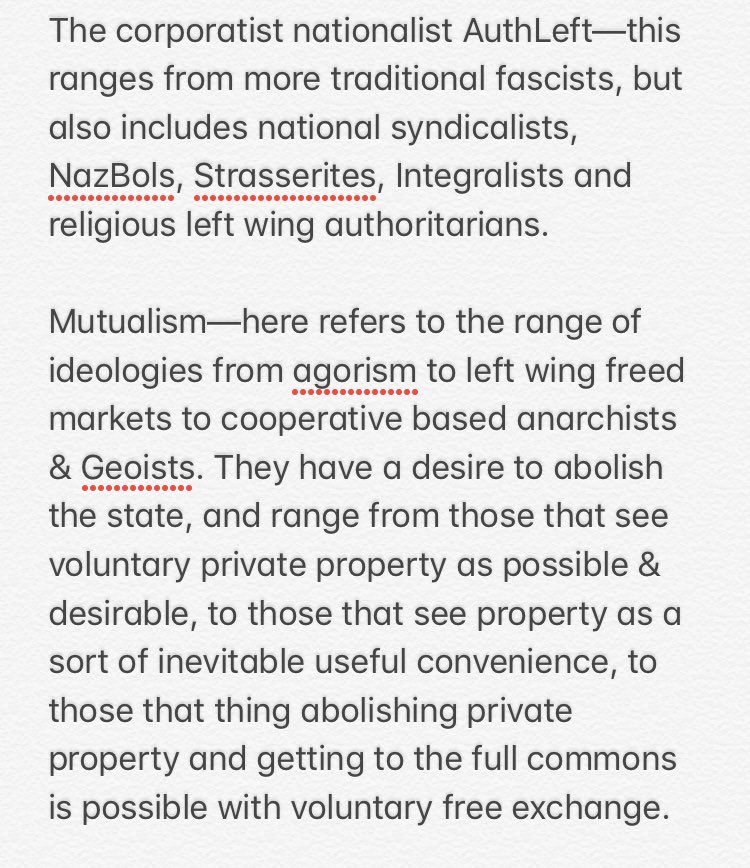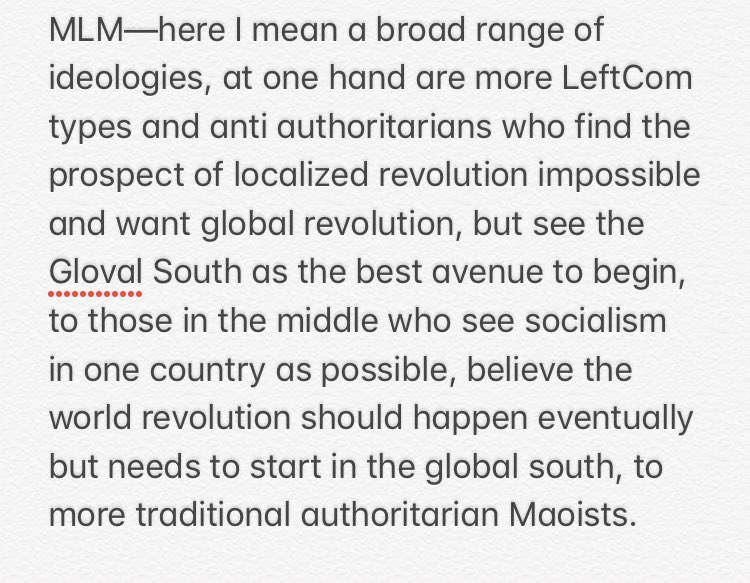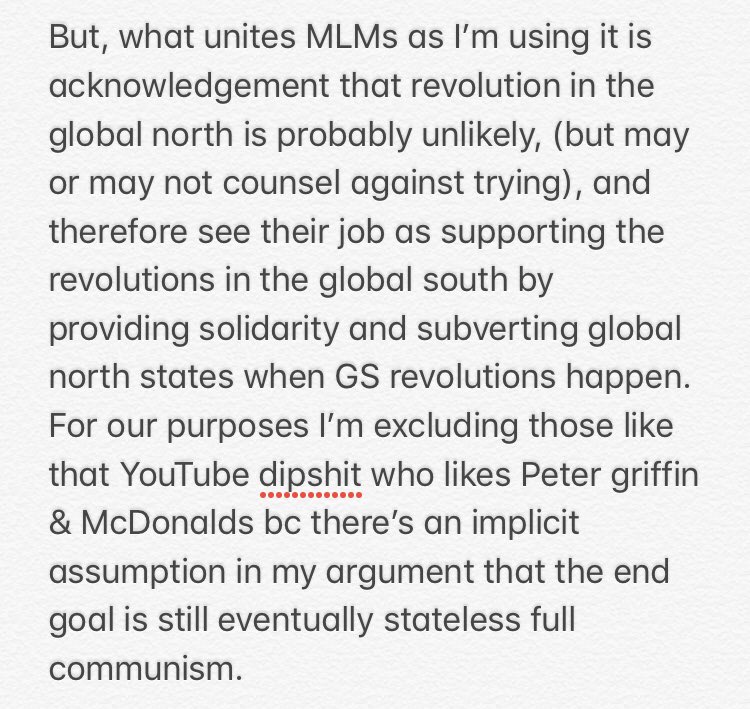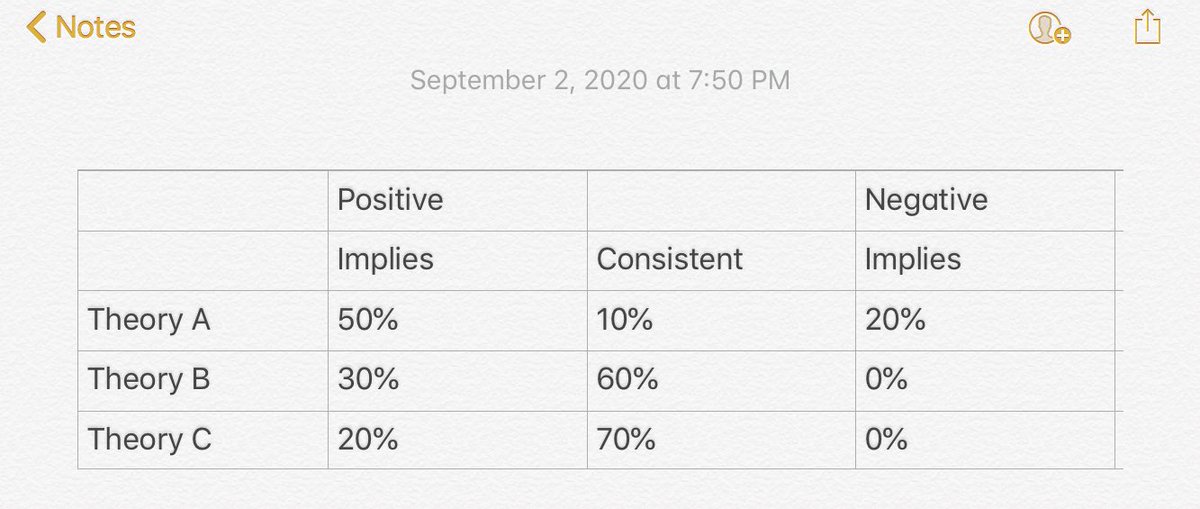What I don’t get about mass & electoral politics based leftists, whether Soc dem, dem Soc, or some other kind like ML, is why they either don’t just become either:
1. A kind of left nationalist Kantian perpetual peace global social democrat OR
2. An MLM of sorts
1. A kind of left nationalist Kantian perpetual peace global social democrat OR
2. An MLM of sorts
Those are the only mass politics, left wing, especially electoral formulations, consistent with the actual facts of the world, and what we know about history, theory, and social science.
The latter one is easier to explain—the facts are that the global north are almost entirely & constitutively on the side of capital, and have MASSIVE bourgeois, renter, Petty bourgeois, labor aristocrat, professional, non economic elite, and reactionary populations.
That’s just the facts. So it would seem the best case there is to be a kind of reformist for the global north, but to organize a counter power base that can work to defang & undercut the imperial metropole from within When revolutions happen in the global south
Push for an aggressive social democratic corporatism in the global north, combined with pacifism & non interventionism, while building below ground covert counter power to distract, stress & subvert the global north When global south revolutions happen
The first one is a bit different—it’s based off the notion that if you think the state and even some kind of market or wage based planning is inevitable, you should just support a global federation of social democratic secular leftwing nation states.
I don’t think the state or capitalism are inevitable & I don’t think the left can win with elections & i don’t think we need mass broad based support to force emancipation, so I don’t really have to worry about these things.
I’m also a kitchen sink pragmatist, in that, if I’m proven wrong, and elections somehow led to a socialist revolution that could transition to true communism, i would welcome it. I just think that’s assuredly impossible.
For this next part I need to heavily emphasize that when I say something is self consistent & the consistent application of a theory to facts, assuming that theory & facts, is NOT an endorsement of the ideology:
Plenty of self consistent ideologies that consistently apply themselves to the world’s facts are abhorrent, &, in my view, incorrect.
Theocracy, retributivism, Hobbesianism, Schmittianism, & others are self consistent & consistent application of their assumptions. But i disagree with their assumptions & their view of the facts & i disagree with their norms.
So, in my next section, let me make it clear I do not agree with either of the ideologies mentioned, their assumptions, the facts they assume about the world, or their values.
My point is instead that if one accepts the conceit of the inevitability of the state &/or market, the necessity of mass broad based consensus or vanguard politics, & some vaguely Left flavored or aestheticized worldview, that these follow.
Leftwing corporatist nationalism, either secular & state based (forms of Bonapartism) or ethninationalist (like Strasserites) are the inverse. They accept the moralistic anti market analysis of the left, but not its general values & see the state as inevitable.
Mutualism is the belief that voluntary mass politics can overturn the state & de-stratify exchange & the market to achieve left wing goals of emancipation.
Left corporatist state nationalism is the belief that a state, Led by the vanguard of a mass movement, can utilize nationalism, authoritarianism, & the destructive aspects of the current society to achieve a socialist anti market society.
Both are self consistent & are consistent applications of their views to the world. And are consistent in which facts they assume. I dispute their axioms & their factual assumptions, & in varying ways their values.
In general, mutualists tend, in my opinion, to have their heart in the right place & tend—however much it might pain you to admit it—to be smart, thoughtful & knowledgable. I dispute, however, their voluntarist, mass politics, liberal & democratic assumptions.
I also dispute their definition of markets & exchange, their understanding of property, and their factual assumption that markets & exchange are inevitable.
With the nationalists it’s an almost entirely different situation, because their hearts are not in the right place, most are incredibly bloodthirsty, and they’re almost exclusively ignorant, poorly read, not thoughtful, & bad theorists.
I dispute their model’s assumptions, such as the inevitability & desirability of states & nations, my critique of capitalism isn’t moralistic, & I see mikitarism, nationalism, statism & mass violence as despicable, ineffective, self defeating, unjust & inequitable.
So, if mutualists are good hearted self consistent libertarians that aren’t racist or propertian, but have read Marx, the left corporatist nationalists are bad natured, bloodthirsty fascists with red aesthetics that haven’t read bupkiss.
And while everyone makes fun of mutualists and, st the opposite end, NazBol/Strasserite types, the fact is both are self consistent & consistent with belief in mass politics, and the facts of the world today, albeit in opposite ways.
The fashy left, instead of denying the intrinsic tie of the state to nationalism, violence, authoritarianism etc, and of denying the way that nationalism is the main guiding principle of solidarity in the world today, recognize it and generalize it. Very scary tbhZ
They recognize the perverse immanent logic at the center of the global system, and rather than try to abolish the war machine, the state, civilization, militarism & nationalism want to weaponize them for the sake of their moralist anti capitalism
The Mutualists are almost the exact inverse of this—they see markets, voluntarism & exchange as the inevitable ones & say ‘well if that’s the case how do we make the system that kills the fewest people within the system’
Mutualism, therefore, is taking the ethical, & outcome variable ends of the left, & applying them to the world, and the assumption that aspects of the market etc are inevitable, so we should defang them & to get there should use mass voluntary politics.
These 4 almost form an exact political compass, except they’re all on the left side of the political compass with the center as the right—
1. Auth Right—Left Corporatist Nationalism
2. Auth left—Kantian liberal nationalist but globalist secular social democracy
3. Lib Left—MLM
4. Lib Right—Mutualism
2. Auth left—Kantian liberal nationalist but globalist secular social democracy
3. Lib Left—MLM
4. Lib Right—Mutualism
Anyway, I disagree with all four broad based meta ideologies as presented here although it’s probably clear to which ones I am most sympathetic. I agree largely with the MLMs end goals (at least the most traditional communist or Leftcom ones), muxh of their tactics, (cont.)
(cont.), and I agree with the futility of revolution in the Global North & subverting the GN it when there are revolts in the Global South.
I am less sanguine about the possibility of using the state or the possibility state withering way. I do not think disconnecting GS states from global capital is particularly possible, & i do not trust party, vanguard & most mass based politics.
With Mutualism, I am sympathetic to their aversion to violence, & their commitment to freedom & ultimately voluntarism. I do not think peaceful gradualism, voluntarism, & exilic communities to be sufficient to overthrow the world order.
I also disagree with them about their definitions of markets, exchange, and property, do not see property as possible without the state, & do not think long run voluntary exchange based markets can exist without the rest of these issues arising.
I also think that, even if such a voluntaristic classless stateless non capitalist long run market end state were possible that at any transition point from the current state & capitalist system to that other system, the state & capital would reassert themselves.
I also don’t think mass consent or convincing everyone is necessary or possible on the way to an end goal, but also i don’t think this necessitates a party or vanguard etc.
The liberal Nationalist SocDem & DemSoc types think states are inevitable, I don’t. They see elections or councils, democracy & so on can be separated from their role in liberalism & capitalism, and I don’t.
They see nations, or at least geographically & culturally bounded states & organic and/or formal communities are the inevitable & natural way of organizing humans. I don’t.
They either believe that a global system of these states can be run together peaceably with some sort of grand multi national system of states, a confederation, or a Kantian global state. I think each of these are impossible or undesirable for their own reasons.
They think that either some kind of markets are inevitable or that they can be democratically reformed in the context of the state. And they do not see the reassertion of & recuperation by state, military, bureaucracy & capital, as inevitable, I do, at least in their system.
For these types, if they’re motivated by genuine humanitarianism, empathy, & are thoughtful, I can see them as well intentioned etc. but there are also those—the M4A plus Petty boug social conservatism types that come from a totally different value frame than mine.
Finally for the auth nationalists corporatist leftists there’s basically nothing in common between me & them. Indeed, after traditional fash & authoritarian capitalists I share the least with them of any ideology.
I strongly dispute their assumptions about the necessity &/or desirability of the state, capitalism, the nation, productivism, moralism, retributivism & either modernism or traditionalism, romanticism Or technocracy.
They usually have a facile & totally empty understanding of history & social science and are usually anti intellectual.
While intellectual versions of them exist—arguably Schmitt falls under this, some Hegelians, the Nouvelle Droight, the fourth positionists, and the revisionist Zionists all are versions thereof—they’re the exceptions and also are, you know, full of shit.
I think this constellation of authoritarian nationalist leftist ideologies is genuinely terrifying because like I said, they are self consistent, apply their views consistently to the facts, & share many ideological assumptions with the broader culture.
This makes them scary because it means they can seemingly provide an alternative to the current capitalist system, while appealing to those is elite & privileged or declining in privilege contradictory social positions.
Since downwardly mobile petty boug, upwardly mobile professionals, and reactionaries form such a large part of the Global North citizenry, in light of capitalist & other strains, these ideologies may keep growing.
This is especially the case when what is mistakenly called ecofascism is considered, namely that dominant immanent tendency within liberal capitalist states toward population & social control, Natalism, ecomodernism, & sacrifice zones.
In the Global South, the worry is that said movements can appear as emancipatory in the context of imperialism, OR are useful tools of recuperation by the global north to subvert genuine left wing emancipatory movements. This means they’ve wide potential globally.
In truth, we’ll probably see something more akin to technocratic, ecomodernist, pro high tech, corporatist, militarist, neo feudal capitalism emerge globally before we see a mass wave of left wing ethnonationalists, but both are possible.
anyway, in light of the facts about the class composition of Global North & south societies, the nature of the state & capital, the future of technology, the ongoing & upcoming biosphere collapse, the resurgence of right wing & ethnonationalist populist movements globally (cont)
(cont), the historical failure & recuperation & intrinsic contradictions of party, vanguard, electoral &/Or mass based politics, the seeming arc of the relevant history, social science & theory as well as (cont.)
(cont.) the common values, norms, assumptions & implicit premises that many leftists have & share with the dominant ideology, these are the poles of the self consistent ideologies consistent with the above facts, that (cont.)
(cont.) have a desire to preserve mass politics, broad social consent, piecemeal revolution/reform, & want to avoid anarchist ideology, insurrectionsry tactics, a process orientation, a demand based politics & a much deeper harsher form of broad critique.
While they take account of all the above & meet its features, its clear they differ on fundamental factual & other assumptions, such as whether they see it is either, or both state & capital are inevitable, at least for now.
The comparison between these ideologies stops at the features I’ve listed, and does not share their core values, axioms, models, norms, or factual foundations beyond the above.
The type of politics I believe in are:
1. Process not product politics—politics is about an ongoing process, not an achieved end
2. Dynamic/heterotopian not static/utopian—i do not believe in an end of history or that our work is ever done
2. Dynamic/heterotopian not static/utopian—i do not believe in an end of history or that our work is ever done
3. Demand not policy based politics—i care less about formulation policies, let alone by some genius central planner or party, than I do about making continual demands on the system until they’re met or it collapses
4. Critique not program based politics—there is more to critique than agree on, it is easier to agree on critiques than on solutions, the horizon of our imagination for solutions is intrinsically limited, & critiques give us more room to maneuver
5. Insurrectionary not mass—I do not think universal mass consent is necessary or possible, and i think we need targeted, tactical, horizontal concrete struggles based on ever expanding networks of ungovernability
6. Collective & structural not individual & agential strategy & ontology, but individualist not collectivist ends, i.e. i see collectices & structures as the lock of change, behavior & capability, but individuals as the beaters of rights & desires
7. Anarchism not statism—I do not believe the state, or any authoritarianism, domination, coercive hierarchy etc, is either necessary/inevitable, or desirable/sustainable
8. Global not local ends, but local not global means—i believe in decentralized & networked & expanding local concrete struggles & zones of emancipation & ungovernability, but also that socialism in one country is impossible, only a global outcome suffices
9. Contingency not inevitability—i do not see markets, states, civilization, modernism, industrialism, extractivism, class, Cis/het/patriarchy, white supremacy, social division of labor, property, & stratification as necessary, inevitable or emerging due to benefits it conferred
10. An ever expanding circle, not a closed one—I focus on an ever growing non exclusive in group, that by definition is never finished growing, and one day should hopefully encompass all life in the world, and beyond, as part of our broader community
11. Anti-retributivist, anti-moralist, Anti-carceral, penal abolitionist—I do not see vengeance, individual or collective as just, do not see caging living beings as valid, and do not support moralistic analyses of individuals & structures
12. Ecological politics—i reject ecomodernism, extractivism, anthropocentrism, and anythibg which destroys the biosphere, considers humans & nature separate, murders human & non human animals, & depletes stocks of resources etc
13. Generalized ruthless critique of all that exists, not taking things for granted—I do not see civilization, technomodernism/Utopianism, hierarchy, current social roles, things like nations, or sentimental, aesthetic attachments & prejudices as free from criticism
14. Anti violence (in the last instance), harm, mass death & coercion, but not pacifistic, complacent, etc, our goal is to create a world free of violence, harm, coercion & mass death, but we have the right to defend ourselves & overthrow the system.
15 . Pluralism, pragmatism, contextualism, skepticism, anti dogmatism, historicism, pro-science but anti-scientism, relativism & constructivism—in some ways my core discursive, epistemic, methodological, reflective, instrumental & implementation belief (cont.)
15. (Cont.) all of the above, save fundamental values etc, is open to revision, I embrace a kitchen sink approach. I welcome any successes that come from tactics/strategies different than the 1s I mentioned, & the ones I mentioned are designed to be able to accommodate (cont.)
15. (Cont.) the opposed ideologies—in other words, insurrection is designed to allow for mass politics, process politics to allow for product politics, critiques to allow for (ruthlessly critiqued) programs, and demands to allow for policies.
But I also have several intellectual values & heuristics that I care about, to the best of my ability when creating or analyzing a theory & evidence—below are BOTH the institutional/social/epistemic conditions but also the values, norms, & methods required for them
1. Self reflection & attempts to have clear understanding of my norms, values, factual beliefs, assumptions, axioms & so on, often achieved socially & through conversations
2. Dialectical translating shared provisional piecemeal framework creation—I am to reciprocally, & either socially or with myself, create coming frameworks for understanding that can translate & accomodate between different systems
3. Knowledge created through a mix of critical, skeptical, cooperative but agonistic institutions, methods & processes of knowledge creation, with norms of good faith, synthesis, evidence, publicity, repeatability, breadth, depth, precision, accuracy, coherence, prediction etc
4. Plural, pragmatic, relative, provisional, constructive & so on epistemic & other frames that allows me to develop knowledge rigorously across different modes—science, history, experience, literature, social science, humanities, arts, reasoning, math, etc
5. The ‘no magic’ or ‘atheist universe’ condition—regardless one’s spiritual or theological beliefs, magic, miracles, superstition, theistic views, idealism, esotericism , & spiritualism cannot make their way into our fundamental methods, evidence, theorization etc**
**theres one sort of big exception to this which is ‘unless there is some very explicitly stated reason why’ and that’s only for other people—for their frameworks or for me to find common ground with, say, a religious person—but i won’t use it in my system
6. Not objective but intersubjective, not a view from nowhere or everywhere but many wheres
7. Knowledge produced under conditions of relative equality, cooperation, freedom, autonomy & absent coercion or manipulation thru force or fraud
7. Knowledge produced under conditions of relative equality, cooperation, freedom, autonomy & absent coercion or manipulation thru force or fraud
8. Synthetic, plural, eclectic, & broad, while not comprising rigor & depth—i.e. try to accomodate as many disciplines, methods, sources, values, norms & frameworks as possible, without losing traction or usefulness
However, for this to be true a certain set of values, norms, methods & assumptions must be upheld—many of these are already listed above (pluralism, pragmatism, synthesis, good faith, dialectics, provisionality, self reflection), but there’s also some more basic ones.
1. Good faith—this can be used to refer to individuals, intentions & actions, but it also has a broader meaning, which is to say, engaging in discourse & practice that is not designed to produce bullshit or to terminate thought & further inquiry
In this way, someone can be sincere but still bad faith, if they’re engaging in thought terminating or inquiry repressing discourse & actions.
2. Reflexivity, self reflection, honesty, self critique, & statement—constant individual & social reflection, statement of ones honest goals, values, definitions, beliefs, norms, methods, prejudices, interests, mistakes etc
3. To neither seek consensus nor dissensus, ‘winning’ or losing, convincing or disproving, but to find as robust & critical enough of a shared framework to allow mutual translation, conversation etc to occur & to allow each to be *as correct as possible*
4. Internal Consistency—do ones axioms, models, frames, values & factual assumptions contradict each other?
5. Symmetry—does the model and/or the interlocutor apply their model to like cases in an alike manner, or non alike ones in a non alike manner, as specified by their models relevance conditions and/or those relevance conditions pressupposed to make it coherent
6. External consistency—is the model consistent with the facts etc, does it apply itself to the facts consistently, and do they draw valid logical conclusions from their consistent applications of models to facts
7. Implied/pragmatic/performative consistency—does the model produce implications, presuppose sufficient conditions of possibility, or coherently handle its associations or applications in practice to the facts etc, in a consistent way
8. Factual non rigidity—how sensitive is the theory to different facts, especially of disputable rank, and can it be applied even if those facts are wrong, what’s more
9. non-anti-falsifiability—What this means is that while I do not subscribe to falsifiability as demarcation within or between science etc, I think that models/theories/people should not have intrinsic means to dismiss contrary facts etc from the get go.
As in, you can’t be like Freud and say any critic proves his theory Cus they’re neurotic, and you can’t dismiss all contrary facts as false consciousness & propaganda without independent evidence.
10. Weak falsifiability—contrary evidence should be addressed with as a few ad hoc hypotheses as possible, the ones that do exist are consistent $ preferably immanent in the theory already, & contrary evidence on weight *shifts the burden of proof* it does not disprove the theory
So, in the first example here, very simple, I do not consider theory B disproven, but I do think the burden of proof is on theory B relative to theory A
In more complex examples we can look at evidence as positively consistent, positively implies, negatively consistent (inconsistent), negatively implies (contradicts), and neutral. But these are harder to adjudicate. I scrambled the order but the 2nd is simpler than the first.
Without at least some formulation of these latter norms, the first methodology becomes basically impossible, and it is with regard to those norms & methods that the first half of my thread is written.
In other words, the first half of my thread basically says, if you want to have a product, program, policy, final state view of politics, and you are committed to mass politics, the inevitability of this or that fact about the world, and the host of other norms etc i mentioned
And IF you are honest about your commitments & the facts, THEN the four poles I described are the only consistent, self consistent, & symmetrical way to keep all the things you want, in light of what we know about the world.
Part of why I did this exercise is precisely to show you why I am skeptical of mass based, product, program & policy based politics, and why I am an anarchist with a preference for insurrection.
For, in being an anarchist, communist, with a preference for process, critique, demand & insurrectionsry based politics, my model doesn’t have to deal with the same factual, theoretical, historical, empirical & normative provlems.
Basically I get to keep the baby and throw out the bath water, because my system is designed to achieve radical emancipation, defined negatively against the oppressive conditions of the world, but in a way I feel that doesn’t resign me to hopelessness or recuperation.

 Read on Twitter
Read on Twitter














